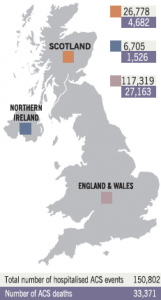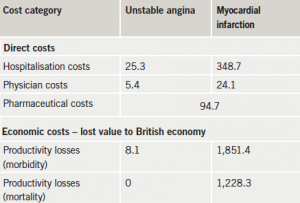News from the world of cardiology

New figures for 2009-10 show that direct healthcare expenditure and economic losses due to acute coronary syndromes (ACS) in the UK amount to £3.6 billion annually, while the burden of ACS to society is valued at up to £9.8 billion.
The figures announced recently by HEART UK were published in a report The burden of acute coronary syndromes in the United Kingdom, authored by Charles River Associates and commissioned by AstraZeneca (available from www.crai.co.uk/publications).
According to the report, hospitalisations due to ACS in the UK during a 12-month period from 2009-10 were 150,802, with 65% due to myocardial infarction (MI) and 35% due to unstable angina (UA). There were also 33,000 deaths from ACS in the same period (figure 1). The direct costs and economic costs due to lost productivity are shown in table 1.
Looking at the burden of the disease on society, the report estimates 327,522 disability adjusted life years (DALYs) were lost in 2009. Assuming a willingness to pay around £30,000 per DALY to reduce this burden, the authors calculate the societal cost of ACS for the UK as £9.8 billion.

At a parliamentary reception to launch the report, HEART UK, together with the British Association of Cardiovascular Prevention and Rehabilitation and AntiCoagulation Europe, identified how using existing post-event services optimally could not only improve the experience and outcomes for patients, but could also save money which could contribute to the £20 billion efficiency savings that must be delivered between 2011 and 2014.
They called for access to cardiac rehabilitation services to be broadened, discharge information to be improved, adherence to medication to be maximised, and psychological health problems in patients suffering a cardiac event to be addressed.
